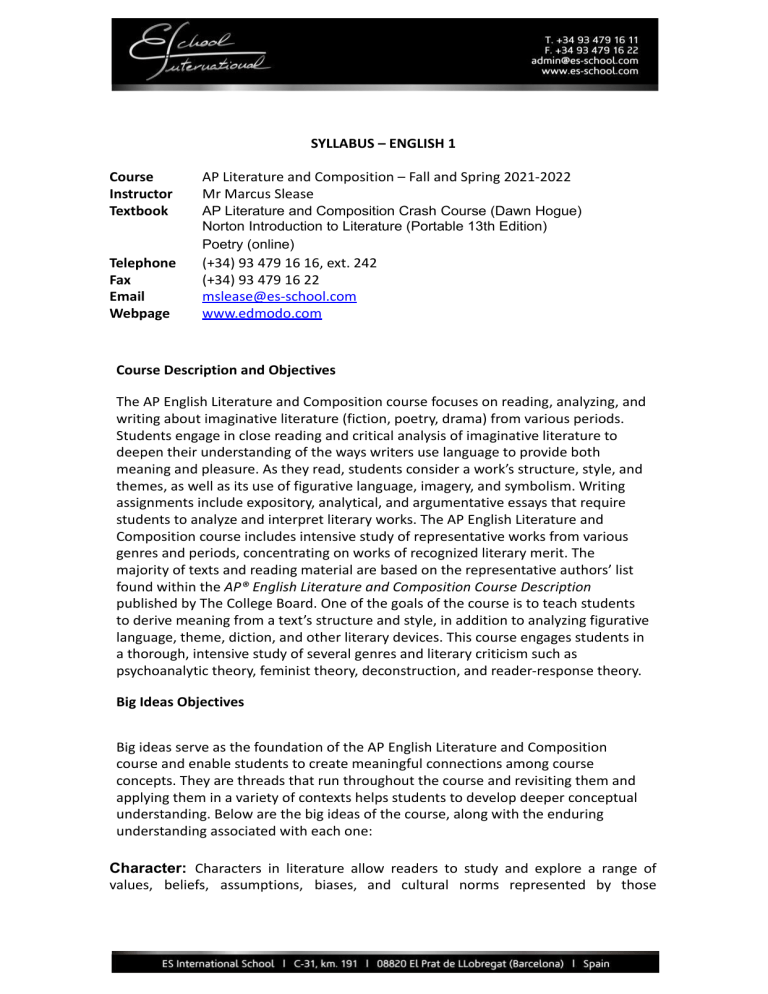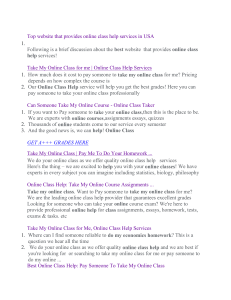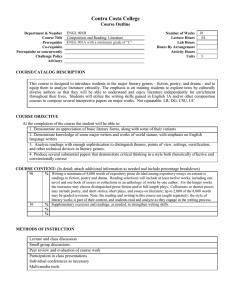AP English Literature Syllabus: Course Overview & Objectives
advertisement

SYLLABUS – ENGLISH 1 Course Instructor Textbook AP Literature and Composition – Fall and Spring 2021-2022 Mr Marcus Slease Telephone Fax Email Webpage (+34) 93 479 16 16, ext. 242 (+34) 93 479 16 22 mslease@es-school.com www.edmodo.com AP Literature and Composition Crash Course (Dawn Hogue) Norton Introduction to Literature (Portable 13th Edition) Poetry (online) Course Description and Objectives The AP English Literature and Composition course focuses on reading, analyzing, and writing about imaginative literature (fiction, poetry, drama) from various periods. Students engage in close reading and critical analysis of imaginative literature to deepen their understanding of the ways writers use language to provide both meaning and pleasure. As they read, students consider a work’s structure, style, and themes, as well as its use of figurative language, imagery, and symbolism. Writing assignments include expository, analytical, and argumentative essays that require students to analyze and interpret literary works. The AP English Literature and Composition course includes intensive study of representative works from various genres and periods, concentrating on works of recognized literary merit. The majority of texts and reading material are based on the representative authors’ list found within the AP® English Literature and Composition Course Description published by The College Board. One of the goals of the course is to teach students to derive meaning from a text’s structure and style, in addition to analyzing figurative language, theme, diction, and other literary devices. This course engages students in a thorough, intensive study of several genres and literary criticism such as psychoanalytic theory, feminist theory, deconstruction, and reader-response theory. Big Ideas Objectives Big ideas serve as the foundation of the AP English Literature and Composition course and enable students to create meaningful connections among course concepts. They are threads that run throughout the course and revisiting them and applying them in a variety of contexts helps students to develop deeper conceptual understanding. Below are the big ideas of the course, along with the enduring understanding associated with each one: Character: Characters in literature allow readers to study and explore a range of values, beliefs, assumptions, biases, and cultural norms represented by those characters. Setting: Setting and the details associated with it not only depict a time and place, but also convey values associated with that setting. Structure: The arrangement of the parts and sections of a text, the relationship of the parts to each other, and the sequence in which the text reveals information are all structural choices made by a writer that contribute to the reader’s interpretation of a text. Narration: A narrator’s or speaker’s perspective controls the details and emphases that affect how readers experience and interpret a text. Figurative Language: Comparisons, representations, and associations shift meaning from the literal to the figurative and invite readers to interpret a text. Literary Argumentation: Readers establish and communicate their interpretations of literature through arguments supported by textual evidence. Selection of Texts Issues that might, from a specific cultural viewpoint, be considered controversial, including depictions of nationalities, religions, ethnicities, dialects, gender, or class, are often represented artistically in works of literature. AP students are not expected or asked to subscribe to any one specific set of cultural or political values, but are expected to have the maturity to analyze perspectives different from their own and to question the meaning, purpose, or effect of such content within the literary work as a whole. Basic Class Expectations AP English Literature students are expected to be mature and have the motivation level equivalent to those in collegiate classrooms. Students are expected to work hard, and the hope is that the reward received in preparing for future coursework will make the expended effort well worth the prize. Preparedness: Students are expected to read and complete all assignments before coming to class. There will be interaction, discussion, and/or group work every day. ▪ In-class writing, discussions, and workshops: While there will be some teacher-led discussions, and necessary lectures from time to time, the overwhelming goal for this course is for students to drive prepared discussions, group activities, and writing each day. Please note that in-class group work cannot be recovered if it is missed. Because of the forum-like atmosphere of the AP English Literature classroom, student interaction is required. ▪ Class Participation: Student participation is required. Students are expected to bring individual thoughts, considerations, and opinions to a discussion. While there are no wrong answers or thoughts, student preparation allows for in-scope contributions versus misguided and haphazard responses to essential questions. Diversity of thought ▪ AP Literature and Composition Mr. Marcus Slease | Fall 2021 offers perspectives that can inform conversation, offer insightful dialogue, and present potentially new avenues of discourse. Format for Papers: All papers must be formatted using 12-point Times New Roman font only and must be double-spaced with 1-margins on all sides. Always follow the style guidelines of the Modern Language Association (MLA), particularly with regard to parenthetical and reference citations. Please be mindful that content and form matter with the production of your academic papers. ▪ Homework/Late Work: Present all work in class, in person, and on time. The homework is designed to prepare students for class discussions, tests, and essays. Assignments must be turned in typed and on time, fully completed. However, there will be several opportunities to revise selected essays in order to benefit from the writing process and earn a more desirable grade on a particular piece of writing. It is especially important to keep up with the reading; many students have a challenging schedule, and need to plan their time very carefully. Make-up tests and/or late assignments will be accepted after the due date only for an excused absence for the entire day. Please inform me in advance if you have a planned absence so we can make arrangements. ▪ Grades:Your grades are based on the quality of your work. Hard work is necessary, but I only grade the results of it. Grades will be based on the percentage of the total points earned during each semester. ▪ Absences: It is the student’s responsibility to request make-up work. If students attend school at any time during the day an assignment is due, students are required to submit their assignments. ▪ Tournaments: School sports, events, activities, and/or excursions are not valid reasons for not submitting work on time. ▪ Make-up Exams: Any student that is absent on the day of a test is expected to make up the test during office hours or at an arranged time immediately upon the student’s return to class. If the student does not report to make up the exam within the agreed time frame, no credit (0%, zero) will be given for that exam. Tests may not be made up during class or another class period. It is in the student’s best interest to be present on all exam days. ▪ Course Goals and Objectives This course provides students with the intellectual challenges and workload consistent with a typical undergraduate college English literature/humanities course, at the completion of which, students should be able to: ▪ critically read and analyze American, Latin American, and British literatures in several genres from the 16th century to contemporary times. ▪ write, revise, and edit an interpretation of a piece of literature that is based on a careful observation of textual details, considering the work’s structure, style, and themes; the social and historical values it reflects and embodies; and such elements as the use of figurative language, imagery, symbolism, and tone. AP Literature and Composition Mr. Marcus Slease | Fall 2021 ▪ write, revise, and edit formal, extended analyses and timed, in-class responses. ▪ write, revise, and edit formal, extended analyses outside of class. ▪ write to understand through informal, exploratory writing activities that enable students to reflect upon their reading and their thinking, within the process of writing. ▪ write to explain through expository or analytical essays in which students draw upon textual details to develop an extended explanation/interpretation of the meanings of a literary text. ▪ write to evaluate through analytical or argumentative essays in which students draw upon textual details to make and explain judgments about a work’s artistry and quality and its social and cultural values. ▪ draft, revise, and edit essays reflecting a wide-ranging vocabulary used appropriately and effectively. ▪ draft, revise, and edit essays employing a variety of sentence structures, including appropriate use of subordination and coordination. ▪ draft, revise, and edit essays using a logical organization scheme, enhanced by specific techniques to increase coherence, such as repetition, transitions, and emphasis. ▪ draft, revise, and edit essays which balance between generalization and specific, illustrative detail. ▪ draft, revise, and edit essays that effectively utilize rhetoric, including controlling tone, establishing and maintaining voice, and achieving appropriate emphasis through diction and sentence structure in essay construction. Grading There are several ways in which each student can achieve successful results in this course. For many assignments, such as class debates and research papers, grade analysis rubrics will be provided to guide you through the requirements of each assignment and to advise you what is required in order to earn the best results. The Grading Scale below is a school-wide scale used to evaluate work for its accuracy, completeness, and quality. Grades will be awarded using the following scale: GRADE PERCENTAGE QUALITY POINTS COMMENT A AB+ B BC+ C CD 94-100 90-93 87-89 84-86 80-83 77-79 74-76 70-73 60-69 4.00 3.75 3.25 3.0 2.75 2.25 2.00 1.75 1.00 Excellent Excellent Very Good Good Satisfactory Ineligible for NCAA DI (<2.3) Ineligible for NCAA DI & DII (<2.2) Below Average/Pass Minimum Pass AP Literature and Composition Mr. Marcus Slease | Fall 2021 F 0-59 0 Fail The following criteria will be used to calculate your final course grade: (Grade distribution is within the purview of the instructor, except for attendance which is a school policy). Assessments Assignments Participation Attendance 40% 40% 10% 10% Scheduled Examinations There will be a final exam examination at the end of the semester. The scheduled examinations will be worth a cumulative twenty (20) percent of your total course grade. Please plan and devote sufficient study time and effort to this significant segment of your course grade. Make-up examinations may only be taken when there is an excused absence. There will be no re-testing in this course whatsoever. Writing Assignments Students will develop skills for literary analysis taking into account the greater social and political forces of history and culture in literature, using appropriate literary terminology and a formal writing style. There will also be various times within a semester when students will write persuasive and/or academic essays on given topics. Students should hand-in all work on-time with a typed paper copy. Late papers will be marked down 10% per day. All writing assignments are carefully evaluated and feedback provided. The feedback is meant to assist students in their mastery of the material and should be diligently assimilated into the students’ future work Presentations: In order to further a deeper understanding of the text within the context of a literary tradition or conventions, students will deliver a well-researched, well-prepared and rehearsed presentation on a contemporary writer with a connection to one of the writers from the course reading packet. Oral presentations should be informal yet enlightening. Class Participation, Attendance and Reading Journals Students should be aware of the high level of energy and commitment necessary to be successful at the high-school level. The instructor is committed to provide a course of the highest quality and commits his time, energy, and talents to the process. All students are encouraged to participate in classroom discussions in a respectful manner as participation is an integral part of the course grade. Assigned readings must be completed prior to class in order to participate constructively in class discussions, master an understanding of the course material, and achieve excellent AP Literature and Composition Mr. Marcus Slease | Fall 2021 results. We will be working on respectfully giving and developing ideas and opinions about literature in oral form. Reading Journals must be completed as scheduled and presented in a clear, concise, and orderly manner. You will write responses to the readings both for homework and sometimes during class time. Quality reading journals are the students’ best preparation for class participation, writing assignments, and exams. Students will be advised of the format and standards required, including a grading rubric and student examples, of all submitted work, as well as the standards of behavior and respect required in classroom discussion and debates. Consistent and prompt attendance is an essential course component to earn an excellent grade, and prompt class attendance will be strictly enforced. Students will be penalized one (10) percent for each unexcused absence per class and a half (5) percent for each tardy per class out of the Attendance portion of their course grade (based on a total of one hundred (100) percent. Those students with five (5) or more unexcused absences during the semester will not receive credit for the course. Students are the sole party responsible to recuperate any work missed due to an excused absence. Students who are absent without an excuse on the day of an exam will not be permitted to recuperate the exam. Students who are absent because of illness on an exam day, must have a parent (if living locally) or a medical professional notify the school prior to, or on, the day in question. The instructor will not pursue any student for work missed. Work not recuperated within the prescribed timeline will not be permitted for submission. Therefore, you will not receive credit for the work. Ten percent will be deducted for each day an assignment is late. Any assignment more than five days overdue will not be accepted. When away on tournament, it is the student’s responsibility to submit work and communicate with the teacher via Edmodo on a regular basis. Students must come to class on time and with the appropriate materials (for example: you are expected to have a textbook, laptop, and homework for each day in class). This course will require a significant amount of reading; therefore, students should follow the attached reading assignments carefully. Microsoft Teams A Microsoft Team will be created for this class. On the Team page important dates will be highlighted such as: assignments and homework due dates and upcoming tests and exams. Students are expected to check for updates on a daily basis. When away on tournament, it is the student’s responsibility to submit work and communicate with the teacher via Teams on a regular basis. Electronic Device Usage Students are not permitted to use or have on their possession at any time in the classroom any non-approved electronic devices during the class period. The use or possession of non-approved electronic devices (iPods, MP3 players, cellular AP Literature and Composition Mr. Marcus Slease | Fall 2021 telephones or electronic translators) in the classroom is strictly forbidden. Use of any of these devices during an examination will result in the student’s automatic failure of the examination. Additionally, any student who refuses to surrender to any faculty or staff member prohibited electronic devices will automatically face a Disciplinary Committee Hearing. No Exceptions! Academic Integrity As you know the school learning community has a zero tolerance for cheating, copying, passing on information about quizzes and exams, and plagiarism. To maintain a fair and ethical learning environment, you are expected to uphold the zero tolerance policy and work with academic integrity. Plagiarism is defined as using another person's writings or ideas as one's own without the appropriate acknowledgement such as quotation marks or a properly formatted citation/footnote/endnote. Please be sure to properly format and cite your sources when writing the research paper. Ask a teacher, not a friend, when in doubt about whether something is plagiarism or not. A teacher can help you to adapt something into your own words. AP Literature and Composition Mr. Marcus Slease | Fall 2021 Academic Guidance and Office Hours This instructor maintains an "Open Door Policy" and encourages ALL students to seek help or guidance concerning his/her work in this course when he/she feels necessary. If you have any questions or feel that you need clarification in any particular area, please feel free to see me. This open exchange of information will permit the instructor to give you a continuous evaluation of your progress as the course develops. All students must accept and understand his/her responsibility in the learning process, and it will be each student’s responsibility to seek assistance as needed. AP Literature and Composition Mr. Marcus Slease | Fall 2021


